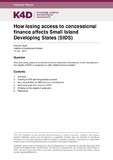| dc.contributor.author | Quak, Evert-jan | |
| dc.date.accessioned | 2019-07-29T13:32:45Z | |
| dc.date.available | 2019-07-29T13:32:45Z | |
| dc.date.issued | 2019-07-16 | |
| dc.identifier.citation | Quak, E. (2019). How losing concessional finance affects Small Island Developing States (SIDS). K4D Helpdesk Report No 626. Brighton, UK: Institute of Development Studies. | en |
| dc.identifier.uri | https://opendocs.ids.ac.uk/opendocs/handle/20.500.12413/14595 | |
| dc.description.abstract | This rapid review synthesises the literature from academic, policy, and knowledge institution sources on how losing concessional finance could affect Small Island Developing States (SIDS) in their economic development. Because most SIDS are middle-income countries, this means that, for the most part, they are not eligible to receive concessional resources from the multilateral financial institutions and preferential trade arrangements, although there may be some temporary exceptions based on vulnerability and smallness. It can be concluded from the literature that graduation does pose challenges for SIDS, although very different per country, and that it is not clear that graduation processes are well handled by both domestic governments and development agencies. This poses a threat for SIDS, in particular because they are extreme vulnerable for economic and natural shocks (e.g. price/demand changes and climate change) due to their geographical remoteness and small size, often resulting in high public debts. This rapid review illustrates with various examples that there are better-placed SIDS and worse placed SIDS, in terms of ability to adapt to changes that are the result of graduation. Overall, it appears that SIDS graduate through a combination of limited diversification towards services, especially tourism, and investment in human capital. The literature also shows clearly that there is little reason to expect that SIDS graduates see a direct positive effect on crucial things like private capital flows such as foreign direct investment (FDI), remittances and portfolio investment. In particular, LDCs that graduate to LMIC status, like Cabo Verde, show high dependency on ODA. | en |
| dc.language.iso | en | en |
| dc.publisher | IDS | en |
| dc.relation.ispartofseries | K4D Helpdesk Report;626 | |
| dc.rights.uri | https://www.nationalarchives.gov.uk/doc/open-government-licence/version/3/ | en |
| dc.subject | Aid | en |
| dc.subject | Economic Development | en |
| dc.subject | Finance | en |
| dc.title | How Losing Access to Concessional Finance Affects Small Island Developing States (SIDS) | en |
| dc.type | Helpdesk | en |
| dc.rights.holder | © DFID - Crown copyright 2019 | en |
| dcterms.dateAccepted | 2019-07-16 | |
| rioxxterms.funder | Department for International Development, UK Government | en |
| rioxxterms.identifier.project | K4D | en |
| rioxxterms.version | VoR | en |
| rioxxterms.funder.project | 238a9fa4-fe4a-4380-996b-995f33607ba0 | en |

